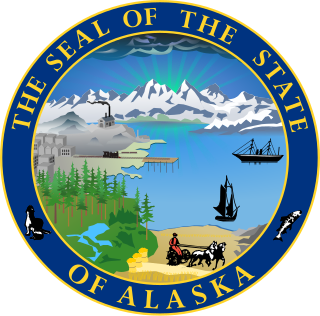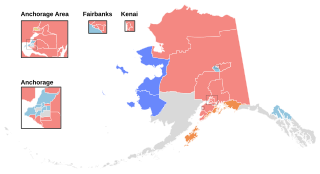
Benjamin Aavan Stevens was an American politician and political advisor who served as the Chief of Staff to the Governor of Alaska, Mike Dunleavy. He previously served as the President of the Alaska State Senate as a member of the Republican Party. Stevens was the son of the late United States Senator Ted Stevens, who represented Alaska from 1968 to 2009.

Bryce Edgmon is a member of the Alaska House of Representatives, representing the 37th District. He served as speaker from 2017–2021. The district includes all or portions of the Kodiak Island Borough, Aleutians East Borough, Lake and Peninsula Borough, Bristol Bay Borough, and the Yukon–Koyukuk Census Area.
The following table indicates the parties of elected officials in the U.S. state of Alaska:

Catherine Andrea Giessel is an American politician. A member of the Republican Party, she has served as Majority Leader of the Alaska Senate since 2023. From 2013 to 2021, Giessel represented District N in the Alaska Senate, including Northeast Anchorage, Anchorage Hillside and the Turnagain Arm communities of Bird, Girdwood, Indian, and Anchorage, all within the Municipality of Anchorage. First elected in 2010 while identifying with Tea Party values, she has also served as the vice-chair of the state Republican Party and had a career in nursing. Following redistricting, she was elected to a different senate seat in 2012. Giessel serves as chair of the Resources Committee and is a member of the Senate Majority Caucus. After Senate President Pete Kelly was unseated in 2018, Giessel was elected president of the Alaska Senate, a post she held until 2021. Giessel returned to the Alaska Senate in 2023, representing the newly configured District E after defeating incumbent Republican Roger Holland. She serves as Senate majority leader in the 33rd Legislature, overseeing a coalition caucus of eight Republicans and nine Democrats.

Lora H. Reinbold is an American politician who was a member of the Alaska Senate. She was a member of the Alaska House from 2013 to 2019, representing District 26. In 2018, Reinbold was elected to the Alaska State Senate representing the G district. She served in the State Senate from 2019 until retiring in 2023. From 2015 to the end of her tenure, Reinbold was the only member of the Alaska State Legislature unaffiliated with a caucus organization, as she was ejected from the Republican-led majority caucus in March 2015.

The 2022 United States Senate election in Alaska was held on November 8, 2022. Incumbent Republican senator Lisa Murkowski won reelection to a fourth full term, defeating fellow Republican Kelly Tshibaka and Democrat Patricia Chesbro.

Gary Allan Knopp was an American politician who served in the Alaska House of Representatives from the 30th district as a member of the Republican Party.
The 30th Alaska State Legislature was the meeting of the Alaska Legislature, beginning January 17, 2017.

The 2018 Alaska House of Representatives election were held on Tuesday, November 6, 2018, with the primary election on August 21, 2018. Voters in the 40 districts of the Alaska House of Representatives elected their representatives. The elections coincided with the elections for other state offices, including the gubernatorial election and the state senate elections. While Republicans gained a nominal majority in the chamber, when the new House convened in 2019, Democratic members formed a coalition with independents and dissident Republicans to re-elect Bryce Edgmon as speaker.

Kelly Merrick is an American politician from Alaska. A Republican, Merrick was elected to the Alaska State Senate in 2022, representing District L in Eagle River. She was a member of the Alaska House of Representatives from 2019 to 2023. She took office as State Senator on January 17, 2023.

The 2022 Alaska gubernatorial election was held on Tuesday November 8, 2022, to elect the governor of Alaska. Incumbent Republican governor Mike Dunleavy won re-election to a second term, becoming the first Republican governor to be re-elected to a second term since Jay Hammond in 1978 and the first governor, regardless of political affiliation, to be re-elected to a second term since Tony Knowles in 1998.

The 2020 Alaska House of Representatives election was held on Tuesday, November 3, 2020, with the primary election on August 18, 2020. Voters in the 40 districts of the Alaska House of Representatives elected their representatives, in conjunction with state senate elections and the biennial United States elections for federal offices.

The 2020 Alaska Senate elections took place as part of the biennial 2020 United States elections. Voters in Alaska elected state senators in 11 of the state's 20 senate districts – the usual ten plus one special election. State senators serve four-year terms in the Alaska Senate, with half seats up for election every two years. Primary elections on August 18, 2020, determined which candidates appeared on the general election ballot on November 3, 2020.
The 32nd Alaska State Legislature represented the legislative branch of Alaska's state government from January 19, 2021 to January 17, 2023. Its initial 60-person membership was set by the 2020 Alaska elections. The Alaska Senate was led by a 14-member majority that included 13 Republicans and one Democratic member.

The 2022 Alaska House of Representatives elections were held on Tuesday, November 8, 2022, with the primary election on August 16, 2022. Voters in the 40 districts of the Alaska House of Representatives elected their representatives, in conjunction with state senate elections and the biennial United States elections for federal offices.

The 2022 Alaska Senate elections took place on November 8, 2022, with the primary elections being held on August 16, 2022. State senators serve four-year terms in the Alaska Senate, with half of the seats normally up for election every two years. However, because most districts were greatly changed in redistricting, elections were held for 19 of the 20 seats; the only exception is District T, represented by Democrat Donny Olson, which was mostly unchanged in redistricting and thus did not have an election. Some senators were elected to serve four-year terms, while others would serve shortened two-year terms.
The Bush Caucus consists of bipartisan members of the Alaska Legislature who represent rural interests. The caucus typically consists of the members of the Alaska House from Districts 37-40 and the Alaska Senate from districts S and T, which cover the Alaskan Bush.

The 2022 Alaska state elections took place on November 8, 2022. The state also held Regional Educational Attendance Area (REAA) elections on the first Tuesday in October.

Thomas C. Baker is an American politician from Alaska who represents District 40 in the Alaska House of Representatives.

The 2024 Alaska House of Representatives election took place on November 5, 2024, as part of the biennial United States elections. All 40 seats in the Alaska House of Representatives were up for election.

















